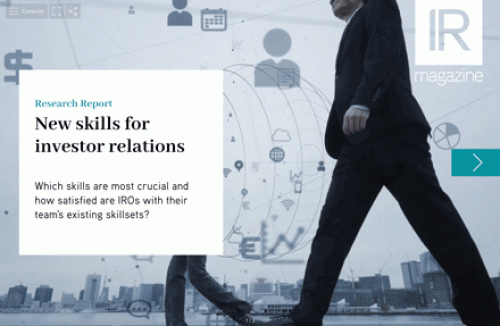IROs speak their mind at the IR Magazine UK Think Tank in London
IR in tough times
Balancing act
‘In the current market conditions, the balance sheet is crucial. The impact that mark-to-market and fair-value accounting has on how you present financial statements is huge. There is a lot of focus on mark-to-market versions and basic cost accounting. The more you speak to international shareholders, the more you realize they often do not understand your conventions, so you need more help than normal from the finance and accounts departments in order to explain accounting conventions.’
‘The credit crunch is really the test of management. All the IRO can do is prepare senior management for the kind of questions to expect. If you have good news, the challenge is getting it out there in quite an engaging way.’
Crisis measures
‘The aviation industry is 12 months into a fairly big crisis so we held a capital markets session in September because of high fuel prices. We felt it important to explain more of the details behind our business model. In the last couple of months things have moved on but some of the issues we’ve been addressing – such as cash and liquidity – have been repeatedly highlighted. We are now seeing some of the counterparties under pressure. The themes are the same; it is just the level of detail that has changed.’
Financial uncertainty and communications
‘If you have no visibility at all, don’t issue guidance – but that has to be a last resort. At times like this investors really have to understand how you are running the business. There’s a huge amount of hypocrisy among sell-side participants at the moment. They’re working for institutions that have contributed directly to many of the problems we are now facing.’
‘The focus has shifted from income statements to calculating balance sheets, and the lines between equity and debt are blurring all the time.’
Strategic value of IR
The limits of the IRO
‘The role of the IRO is to keep spirits and confidence up. If the business objectives were sound six months ago, I expect they are still sound now.’
‘You want to report to the CEO; you will always struggle to be strategically important if you don’t. I am finding that IR is increasingly a soundboard for management, with a much bigger strategic role at the moment. Management members often ask: what would investors think about such-and-such an acquisition?’
‘There is a role for IR in shaping company strategy. There is an expectation you should have an understanding of strategy and how it will evolve. Not many people in an organization have such a broad understanding of the business as to be able to act as a soundboard for it. That understanding can be invaluable because it gives another viewpoint.’
Measuring performance
‘The share price is a poor proxy for performance but it can often be used to work out whether shareholders understand your story. We’ve probably got to a situation where share prices are no longer driven by fundamentals, however. Now, more than ever, you have to find other proxies to ascertain whether you are doing your job well or not.’
‘IR awards can be a good indicator of importance because they are independent. You could be a great self-promoter internally but if you’re not getting the feedback from investors, the opposite could be true. Awards can affect management’s perception of the department, too.’
Career progression of the IRO
Life after IR
‘One of the trends I have noticed is that a lot of corporates now use the IR function as a finishing school for their high-flyers. John Goodwin at Proctor & Gamble was asked to take on the role of head of IR in the US to make him more marketable as a chief executive. Now he runs house as a general manager.’
‘You can acquire skills to help you on the main board but in corporate structures it’s easy to get pigeonholed and there is often not a great deal of fluidity.’
The glass ceiling
‘Where we go next could well be a function of where we have come from. We all have quite different backgrounds. If you do the role for long enough the kind of things you learn could help you in corporate planning and strategy. Whether you are qualified to be a CFO depends on your background. I was once considered to be the next CFO of our company but when I spoke to the recruitment firm it became evident I was missing parts of the traditional skill set, such as tax and risk management. A finance director at a large listed company needs a diverse set of qualities.’
‘At the last company I worked for, I did IR then moved into a line role to perform a quasi-communications job where I helped write bid documentation. I realized one of the attractive things about IR is that often the IRO knows more about the company than anyone else.’










